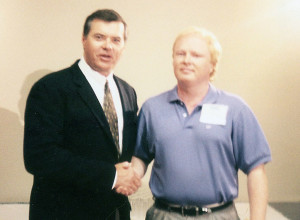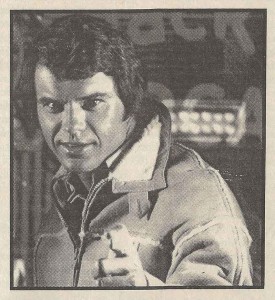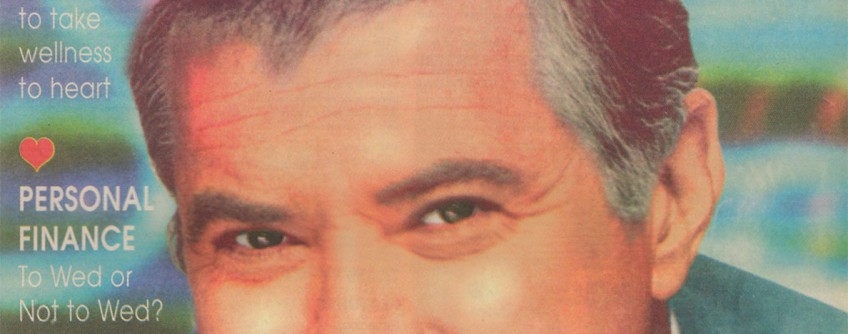 In the autumn of 1997, I flew to Houston and met the actor Robert Urich at the M.D. Anderson Cancer Center.
In the autumn of 1997, I flew to Houston and met the actor Robert Urich at the M.D. Anderson Cancer Center.
It was a basement meeting room, very rudimentary, populated with four journalists and my mother Patsy Paxton, author of the book C Notes: My Journey Through Breast Cancer. We had access to the film and television star until he got tired of talking to us. He spoke at length and cheerfully answered all of our questions after posing for photos.
I remembered Robert Urich as the lucky guy who came on the television scene as the hunky young star of Vegas, which followed Charlie’s Angels on Wednesday nights at the ABC network in the days before cable when a show was watched by tens of millions of people. The beautiful young female sleuths followed by the handsome male detective Dan Tana. Quite a launching pad for what became a lucrative and lasting career that included the role of Jake Spoon on groundbreaking, award-winning Lonesome Dove.
At this time in his celebrated life, he had undergone cancer treatment and been declared cancer free. He didn’t much care for being called “in remission” because he was such an optimist. He certainly looked and acted free of any disease and had a ferocious sense of humor, often self-deprecating. He complained that after chemotherapy his formerly thick hair had grown in like William Shatner’s under that toupee.
The 6’2” actor with the boyish face still looked movie star handsome and relatively unchanged. But the feelings and thoughts he shared with our small group ran deep.
What a shock it was for me when it was announced a mere four years later on April 16, 2002 that he had died from cancer at age 55. He had recently starred in four television films and ten episodes of Emeril, a sitcom starring the famous chef. Evidently, it also took the film industry by surprise, according to what I read. It was sudden.
Remembering the spirited man in that basement meeting room, I guess it was a good way for him to go rather than drag it out, although much too soon. He had found the whole cancer ordeal aggravating. It had slowed him down and he had work to do. I was to find out after speaking with him that the illness had transformed his awareness of life and spirit.
Mom was always a good judge of character and she found him to be more than a dreamy star, but a genuinely nice person. That says a lot to me and confirmed what I felt.
Below is the text for an article that was published in the February 1998 issue Fifty Plus Magazine.
Robert Urich: Changed Forever
by Greg Paxton
Let there be no doubt about it. Robert Urich projects robust health. Sporting casual dress clothes, he looks fantastic. Yet the mischievous gleam in the actor’s eye seems a little wiser; his broad-shouldered stance a little more solid; his good-natured grin now connects with people like a bear hug.
And while his hair is finer than his previous long locks, it has grown back fully in the wake of much publicized photographs of his bald pate during chemotherapy. Urich has been humbled by a harrowing crisis and come through it, not only with his health intact, but stronger of spirit, light with humor, and laser sharp. Most importantly, he’s thankful to be alive.
“I made a pact with God,” says Urich. “I said that he would help me through the cancer than I would figure out a way to make it a positive experience. I pledged to bring integrity to this event in my life and help other folks feel that.”
Urich’s life has long suggested the quintessential American hero. He was raised a strict Catholic on the Ohio River in Toronto, Ohio, a town of six thousand, and his father was a steel worker. He defied the odds of success by going to Florida State on a football scholarship and then hit the jackpot as a well-known and much admired star of television, film, and theater, starring in TV series Vegas (1978-81) and bestselling mystery writer Robert B. Parker’s Spenser For Hire (1985-88), to name just a couple.
Yet cancer had beaten our celluloid heroes in the past. Can we ever forget the very public demise of John Wayne, especially after his final appearance on the Academy Awards show? Sadly, there have been many others.
Fortunately with research, technology, and a new emphasis on mental condition, times have changed. Urich’s message is one of hope. “I was raised in the old world environment where if you used the ‘cancer’ word, it was a death sentence,” recalls Urich.
 Now Urich has been given some very good statistics in the wake of his own diagnosis of synovial sarcoma after having a lump removed from his abdomen. There is a 95 percent chance the cancer will not come back.
Now Urich has been given some very good statistics in the wake of his own diagnosis of synovial sarcoma after having a lump removed from his abdomen. There is a 95 percent chance the cancer will not come back.
“Ten years ago they would have sent me home to die,” he says. “The Cancer Society doesn’t like the word ‘cured,’ it’s for hams. Hey, I love the term ‘cancer free’ and I love ‘survivorship.’ ‘Remission’ I’m not wild about. In the dictionary it means the permanent or temporary subsidence of the outward manifestation of disease.”
Urich attributes the support of his family, friends, and the public to his phenomenal recovery. “I know the outpouring of love I received from the public had a lot to do with the healing process and moving me toward being cancer free.” He jokes that he was on the prayer lists of the Southern Baptists, the Lutherans, the Jews, the Catholics, and other religious groups and that he enthusiastically accepts them all.
Urich also believes that the doctors, the technicians, and cancer research has made the difference. “I’m living proof that research works.”
Finally, he determines that his finding a source of spiritual illumination was an undeniable factor in overcoming cancer. “A part of my going out and talking about cancer is my search for my own authentic self … looking for why this happened and why I’m here. I think it all happened so I could be here.
“I think being an actor and being in the performing arts is a worthy thing to devote your life to. It brings a certain kind of truth to our lives as human beings and elevates us beyond other mammals on the planet. But I think now that my life has begun.”
While cancer has had a profound effect on Urich’s life, he doesn’t recommend it as a matter of course. The irony of that statement isn’t lost on him either, as he chuckles about it. “If you’re going to change as a human being, you have to be predisposed to change. A lightning rod out of the blue isn’t necessarily going to do it, although I’m sure it has happened to some folks that way,” says Urich. “I think it comes from study, by being introspective, and by taking life lessons and applying them.”
This reflection has brought Urich some revelations.
“All we have is today, whether it’s with cancer or not. All we have is this moment. I choose to make it a positive moment. I expect things to go well and turn out my way. And when they don’t, I go about figuring out what I can do to change that. What that does is prevents me from ever becoming a victim. When I start placing blame … poor me … why, why, why … then I give my power away.”
Urich resists the notion suggested to him by several senders of cards and letters that the cancer was a test administered by God.
“I don’t believe that God tests us in those ways. You get these cards and people try to be kind and it says that God never gives you more than you can handle. My answer to that is: then why do people jump off a bridge? Because it’s frightening.”
In a matter of weeks after Urich went public about his cancer on television during a Diane Sawyer interview, he says he received nearly every book written on cancer and every cure. “From bovine cartilage to shark cartilage to Oxygen therapy to come to my clinic in Tijuana,” muses Urich. “I’ve never been one to go to self-help groups. They started to explain it all to me the first few hours … and I just didn’t want to know. I was just going to do it and get on with my life and then I realized I couldn’t really do that. The journey has to change you.
“My suggestion now would be to talk about cancer, bring it out in the open and demystify the thing,” he says although his own experiences with that have not all been pleasant. “I had a hit show on the air and as soon as my boss heard the cancer word, bam, it was cancelled.”
As it turned out, Urich worked on other projects the full time he was going through treatment. “I had two major surgeries, six major chemo courses that lasted nine days in a row, 24 hours a day, a month of radiation, and all the blood testing and other stuff. I still did a movie and a series and even began this journey of public speaking. So don’t be afraid of that aspect of cancer. What we do by talking about it is unleash this army of support, even if some people sneak out the back door.”
Often people feel awkward when being told by someone that that person has cancer. Urich has his own recommendation on how to handle it.
“The first reaction should be ‘oh.’ Do you want to talk about it? Is there anything I can do to help? When you feel like the people around you are willing to go through this with you, it’s not quite as scary. I was scared to death. That I was not going to be able to understand it all. So many things come flying at you.”
The doctor told Urich that on a scale of one to four, with one being a smoldering fire and four being a raging forest fire, Urich’s cancer was a four. It had to be stopped immediately. “Everything I thought to be true up until that moment changed forever,” says Urich.
After this grim news, Urich allowed himself 48 hours to feel sorry for himself. He realized he didn’t have time for any more than that. Then he got past the shock and disbelief. He remembered the fighting mode he had discovered while playing college football and the attitudes of all the heroes he had become famous for portraying. He called his doctor, who had “the bedside manner of Attila the Hun.” It turned out the doctor was just all business and had several thousand other people to take care of.
“This guy treated my cancer very aggressively because it’s a very virulent, insidious cancer and usually winds up with losses of limbs and all sorts of things. He said if you go anywhere else in the country they will cock their eyebrows when you tell them what you’re taking here. By the seventh or eighth day in a row, I was like a caged animal. I didn’t eat or sleep. I just paced watching the clock. I just wanted to rip the wires out of my body.”
Another by-product of Urich’s cancer was the effect it had on his wife, actress Heather Menzies, and their two children. His wife had been open about her fears. However, he did not fully realize the emotional impact the cancer had on his kids until after his recovery.
“They tried to be normal and nonchalant. My hair was coming out in huge clumps and so I sent my son to Safeway to get those clippers. We sat having a beer by the pool on a Sunday afternoon and I just shaved it off and had a laugh. And they bought me this Harley thing to put a round my head with some earrings. You try to get through it.”
Urich kept a diary during the whole experience and may write a book at some point.
Urich’s career is busier than ever. However, it is the speaking engagements on cancer that Urich is focusing on with the passion of a man given a new chance at life. After appearing in Houston, Salt Lake City, San Francisco, Miami, Palm Springs … he says he feels like a rock star.
And even thought the odds are great for Urich’s loving a long and full life, he is still dealing with something that nearly all cancer patients face. Fear of reoccurrence.
“Even now, I’m dealing with an aspect of this journey that I did not anticipate – thinking of cancer every waking minute of every day. It’s something that I would just as soon not have there. I’ve had two major check-ups since treatment and they have been clear and cancer free. And another is coming up next month. And I’m already going: ‘What is that I feel? Is it something I did at work or should I have it checked? I don’t pick up the phone every day and call the doctor and say I hurt. But the last time I had a check up, he told me that I had had two major surgeries and may never feel normal again. Ever. So…”
The bottom line, as they say in Hollywood, for Urich is change. “What it’s really about is coping everyday with the idea that cancer changes you forever.”
Greg Paxton is a national award-winning freelance writer.


Recent Comments